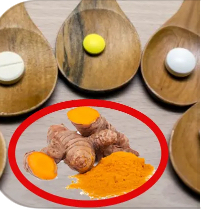Don’t Ever Use Turmeric If You Are On Any of the Following Medications
Turmeric is an extremely beneficial natural ingredient, which is believed to be an alternative cure for numerous different illnesses. Namely, as its use has fewer side-effects, it is often advised as a natural variant of medications and drugs.
However, in some rare cases, turmericcan cause severe negative effects on the health, if used excessively, or if combined with certain drugs.
However, we really want to think about the conceivable results of its utilization too, since it very well may be even risky when joined with specific medications.
In particular, this normal zest likewise meddles with drugs that diminish stomach acids, since it really builds its creation. Subsequently, it can cause stomach pain, bulging, sickness, and harm on the throat. These medications include: Cimetidine (Tagamet), Famotidine (Pepcid), Ranitidine (Zantac) and Omeprazole.
Furthermore, its enemy of thrombotic properties are useful, however on the off chance that you take blood-diminishing medications, they can be risky and increment the danger of d.y.i.n.g. Turmeric ought to in this way not be utilized assuming you take medications like headache medicine, warfarin (Coumadin), and clopidogrel (Plavix).
Turmeric is potentially risky whenever taken in mix with drugs for diabetes, since it reinforces their belongings, and might prompt unreasonably low glucose levels.

The incidental effects, for this situation, include obscured vision, uneasiness, instability, daze and diminished intellectual capacity.
Now and again, turmeric may likewise cause a hypersensitive response, and flare-ups like rashes and hives. In the event that you experience hypersensitive symptoms, ensure you bring down how much turmeric you are taking, or supplant it with another regular cure.
When purchasing turmeric in powder structure, ensure you buy ones that have been guaranteed natural by the US Division of Agribusiness (USDA). Then again, assuming you decide to take turmeric or curcumin supplements, they ought to have a quality affirmation by an outsider.
Moreover, there are no authority suggestions for the admission of turmeric, and the most extreme average admission level has not been distinguished. However, when in doubt, ensure you adhere to the dose suggestions given on supplement names.
With regards to curcumin, the Joint FAO/WHO Master Council on Food Added substances (JECFA) set the satisfactory every day dietary admission as 1.4 mg per pound (3 mg/kg) of body weight, which would be 139 mg day by day for a 178-pound (81-kg) man.


